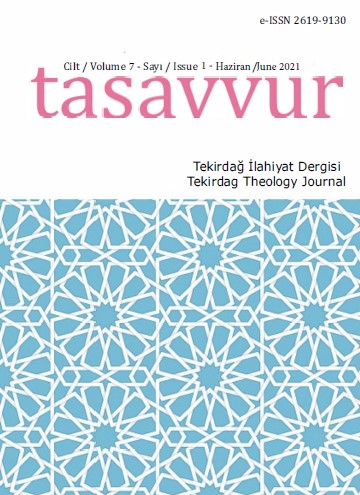Tasavvuf ve Hanbelî Gelenek: Kādî Ebū Yaʿlâ el-Ferrâ’nın Tasavvufa Yaklaşımı Bağlamında Bir Değerlendirme
Sūfism and Hanbalī Tradition: An Evaluation in the Context of Qādī Abū Yaʿlā al-Farrāʾs View of Sūfism
Author(s): Hacı Bayram BaşerSubject(s): Islam studies, Methodology and research technology, 6th to 12th Centuries, History of Islam, Hermeneutics
Published by: Tekirdağ Namık Kemal Üniversitesi İlahiyat Fakültesi
Keywords: Ṣūfism; Ḥanbalīsm; Qāḍī Abū Yaʿlā al-Farrā; Tawakkul; Wara;
Summary/Abstract: Understanding the developments in the early period when Ṣūfism became widespread in the Islamic society, both necessitates studies on other disciplines from Ṣūfism, and requires the consideration of Ṣūfism from the perspective of other religious sciences. In this regard, one of the important names is the famous Ḥanbalī scholar Abū Yaʿlā al-Farrā (d. 458/1066). Abū Yaʿlā al-Farrā who was interested in ḥadīth, Islamic law (fiqh) and tafsīr as well as Ṣūfism and theological issues, has an important place especially with his works in the Ḥanbalī tradition. Abū Yaʿlā, who grew up in a period when the Sunnī theology schools were formed, spread and exercised its influence, he maintained the Ḥanbalī viewpoint and criticized both some schools of kalām and the Ṣūfis by using the kalām method. Therefore, analyzing his views is important for understanding the formative conditions of the first period of religious science tradition, as well as giving clues about the relationship between Ṣūfism and Ḥanbalī tradition. In this article, his views of zuhd (renunciation), tawakkul (trusting in God) and Ṣūfism in general is examined in the context of his works Kitāb al-Muʿtamad fī uṣūl al-dīn and Kitāb al-tawakkul, and his importance in understanding the relationship between Ṣūfism and Ḥanbalī tradition is emphasized.
Journal: Tasavvur Tekirdağ İlahiyat Dergisi
- Issue Year: 7/2021
- Issue No: 1
- Page Range: 207-236
- Page Count: 30
- Language: Turkish

